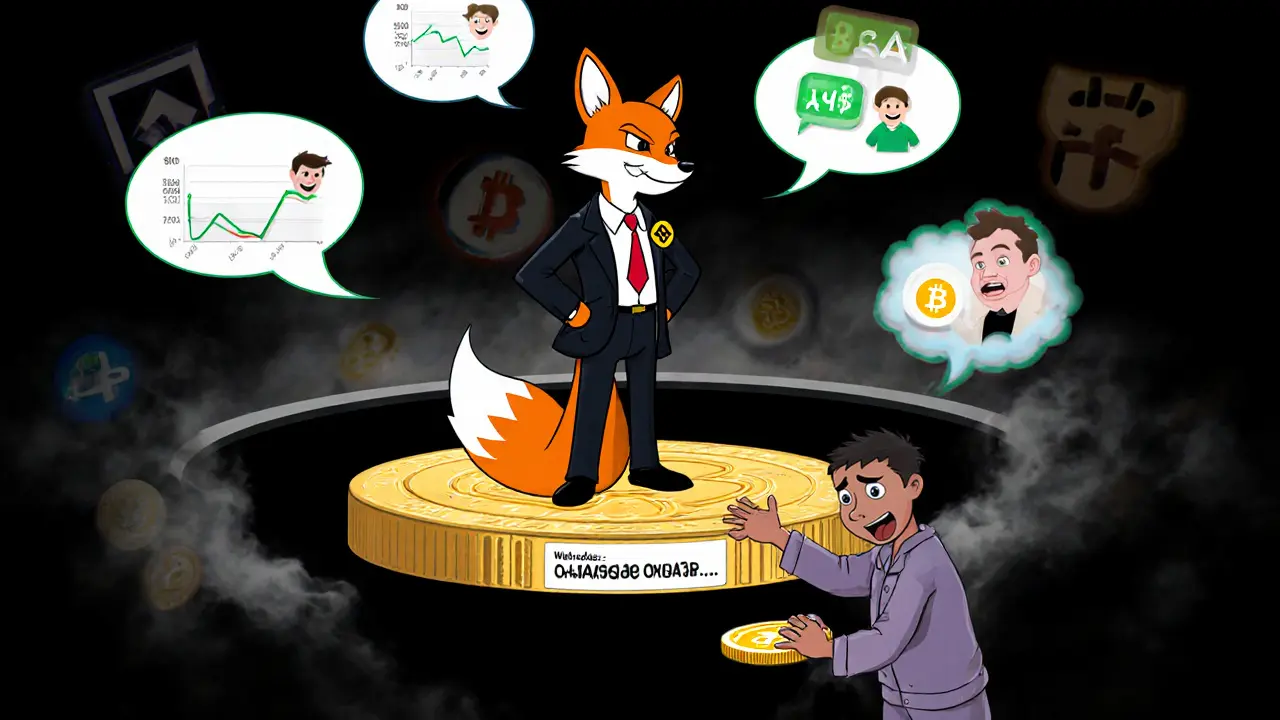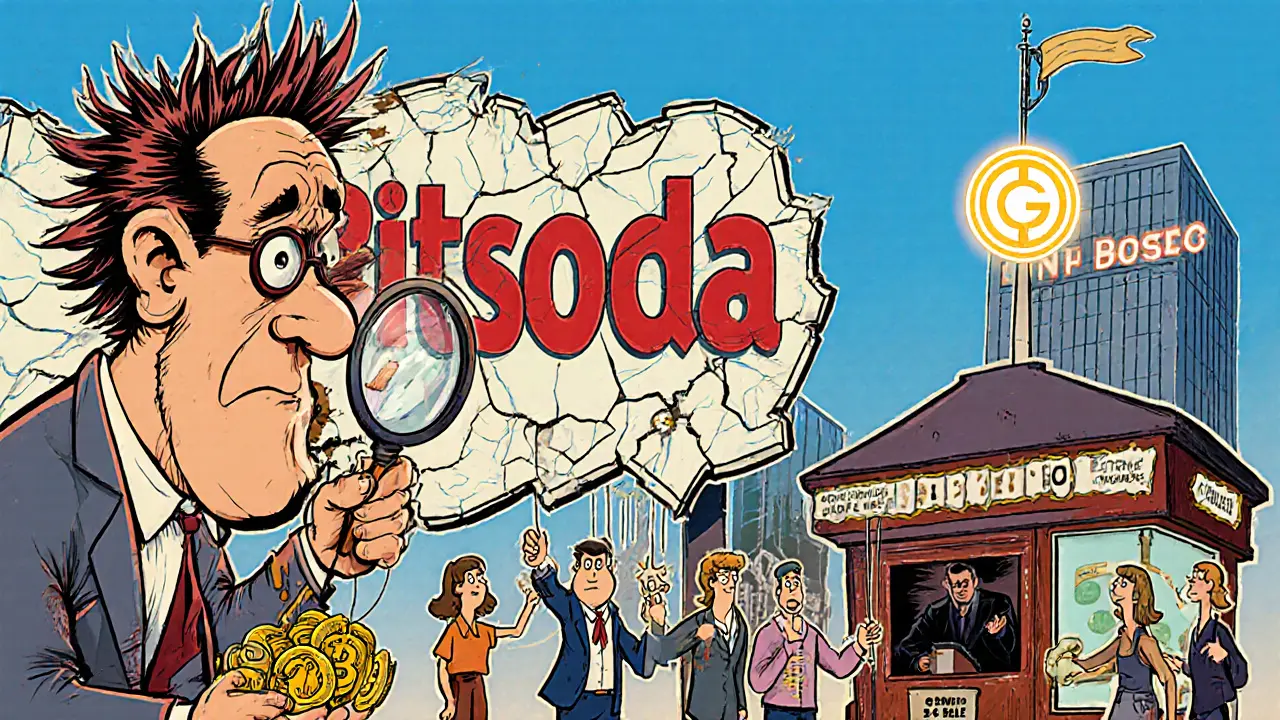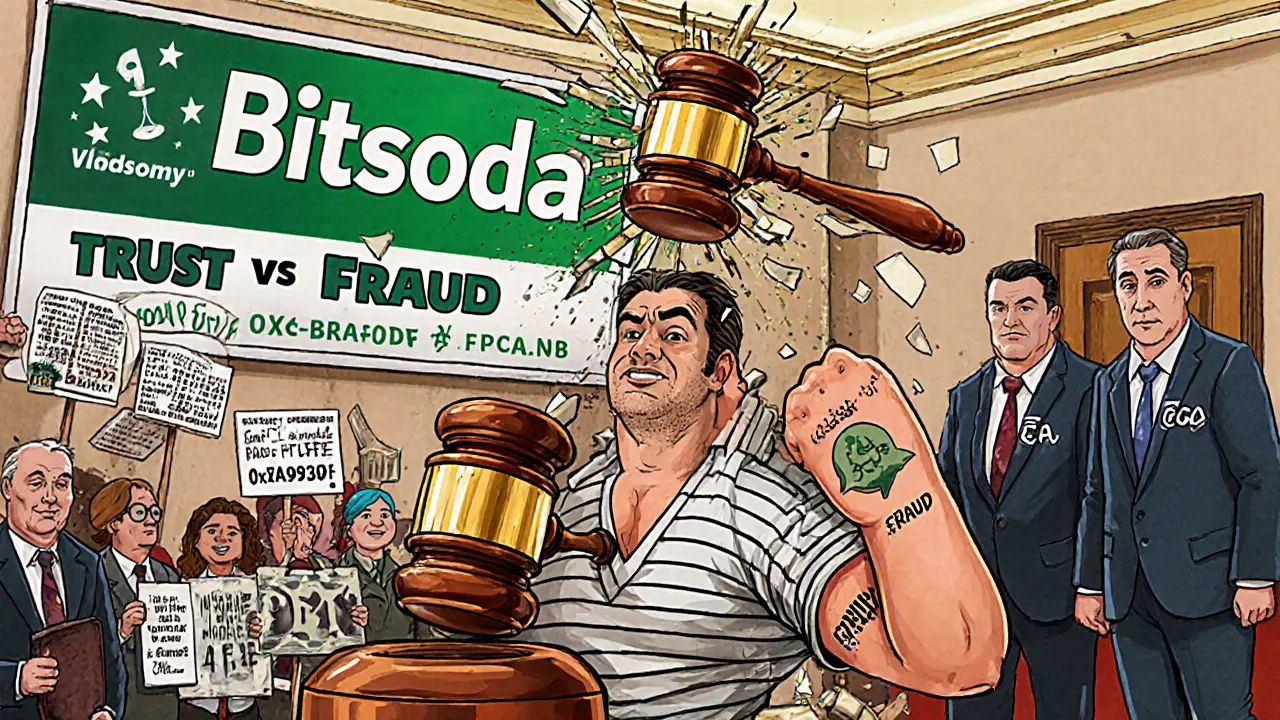Bitsoda Crypto Exchange Review: A Red Flag Scam to Avoid

Nov, 21 2025
Crypto Exchange Risk Checker
Identify Crypto Exchange Scams
Check if a crypto platform matches known scam patterns using the red flags from the article.
Risk Assessment
There’s no such thing as a legitimate crypto exchange called Bitsoda. If you’ve seen ads, social media posts, or WhatsApp messages pushing you to sign up for Bitsoda, you’re being targeted by a scam. This isn’t a poorly reviewed platform - it’s a fabricated name designed to trick people into handing over their money. Think of it like a fake version of Bitso or Binance, built to look real long enough to steal your crypto.
Why Bitsoda Doesn’t Exist
No government agency, financial regulator, or credible tech database lists Bitsoda as a registered crypto exchange. Not in the U.S., not in the EU, not in Canada, not anywhere. The California Department of Financial Protection and Innovation (DFPI) has documented dozens of scams with names like biticrypto.com, cryptex.io, and bitpapa.net - all using the “bit” prefix to sound familiar. Bitsoda fits that exact pattern. It’s not a typo. It’s a trap.How the Scam Works
Victims report being approached on WhatsApp or Telegram by people claiming to be financial advisors or “crypto professors.” They offer free training, show fake profit screenshots, and encourage you to start with a small deposit - $50, $100. You see your balance go up. You’re told you’re winning. Then comes the catch: you need to pay a “processing fee,” “tax fine,” or “verification deposit” to unlock your earnings. The amount jumps to $5,000, then $15,000, then $72,000. That’s what happened to users of biticrypto.com, a platform nearly identical to Bitsoda. The final payment was demanded to a wallet address:0xAA3B939F645aA35CA830940B616919519F10C397. After paying, the platform vanished. So will Bitsoda.
Red Flags You Can’t Ignore
Here’s what every legitimate exchange has - and what Bitsoda doesn’t:- Regulatory registration: Platforms like Coinbase, Uphold, and Gemini are licensed by financial authorities. Bitsoda has no license, no registration number, no compliance statement.
- Transparency: Legit exchanges publish their security certifications (SOC 2, ISO 27001), fee schedules, and withdrawal limits. Bitsoda shows none.
- Customer support: Real exchanges have live chat, email, and phone support with verified contact info. Bitsoda’s “support” is a chatbot or a WhatsApp number that stops replying after you pay.
- Real user reviews: Check Trustpilot, Reddit, or the DFPI’s scam tracker. Legit exchanges have hundreds of verified reviews. Bitsoda has zero credible reviews - only complaints from victims.
Why People Fall for It
Scammers don’t rely on technical tricks. They use psychology. They create fake communities - WhatsApp groups full of “users” who post screenshots of fake profits. They say, “I made $3,000 in a day, you can too.” They build trust by being friendly, helpful, and patient. Then, when you’re emotionally invested, they ask for more money. It’s not about crypto. It’s about manipulation.
Real Exchanges vs. Scams Like Bitsoda
| Feature | Legitimate Exchange (e.g., Uphold, Coinbase) | Bitsoda |
|---|---|---|
| Regulation | Registered with FCA, DFPI, FINTRAC | No registration, no oversight |
| Fees | Transparent: 0.03%-3.49% based on payment method | Hidden fees, fake fines up to $72,000 |
| Withdrawals | Processed in minutes to hours, no arbitrary holds | Withdrawals blocked until you pay more |
| Security | SOC 2, ISO 27001, cold storage, crime insurance | No known security protocols |
| User Support | 24/7 live support, verified email addresses | WhatsApp-only, untraceable numbers |
What Happens When You Deposit
You send crypto to a wallet address. It’s gone. No receipt. No refund. No recourse. Unlike banks or regulated exchanges, crypto transactions are irreversible. Once it’s out of your wallet and into the scammer’s, it’s laundered through mixers, sent to offshore wallets, and disappears. The TRM Labs Crypto Crime Report found that exchanges like NetEx24 and Bitpapa - which operated similarly to Bitsoda - saw 82% of their transaction volume drop after regulators acted. That’s because once exposed, the money vanishes. You’re left with nothing.Global Warnings
The UK’s Financial Conduct Authority (FCA) warns that any platform not registered with them is illegal. Canada’s FINTRAC requires all crypto services to register since January 2025 - unregistered platforms are breaking the law. The U.S. Department of Treasury sanctioned over 80 crypto addresses in 2024 linked to ransomware and money laundering. Bitsoda fits perfectly into this pattern. It’s not a startup. It’s a criminal operation.
What to Do If You’ve Already Paid
If you sent money to Bitsoda:- Stop sending more money - no matter what they promise.
- Save all messages, wallet addresses, and transaction IDs.
- Report it to your country’s financial regulator (e.g., DFPI in California, FCA in the UK, FINTRAC in Canada).
- File a report with the IC3 (Internet Crime Complaint Center) if you’re in the U.S.
- Warn others - post on Reddit’s r/CryptoScams or local consumer forums.
Recovery is rare, but reporting helps authorities track and shut down these operations before they hurt more people.
How to Spot a Fake Exchange
Use this quick checklist before signing up for any crypto platform:- Search the name + “scam” on Google. If you see more scam reports than reviews, walk away.
- Check if it’s on the FCA, DFPI, or FINTRAC warning lists.
- Look for a physical address and phone number - scammers use PO boxes or virtual offices.
- Verify they have a registered company number (e.g., Companies House in the UK).
- Never trust WhatsApp or Telegram-only communication.
- If returns sound too good to be true (“10% daily profit”), they are.
Stick to Regulated Platforms
If you want to trade crypto, use platforms that are licensed and audited:- Coinbase - U.S.-based, regulated in all 50 states
- Uphold - Registered with the FCA, supports 30+ currencies
- Gemini - New York State-regulated, insured custodial wallets
- Kraken - Licensed in the EU and U.S., transparent fee structure
All of these platforms have public regulatory IDs you can verify. Bitsoda has nothing.
Final Warning
The global crypto scam market hit $14.57 billion in 2024 - up 37% from the year before. Most of that came from fake exchanges using names like Bitsoda. They don’t need to be clever. They just need to be convincing enough for one person to fall for it. Don’t be that person. If you’re unsure, don’t use it. Legitimate crypto platforms don’t need to hide. They don’t need to pressure you. They don’t need to ask for fines. If it feels off, it is.Is Bitsoda a real crypto exchange?
No, Bitsoda is not a real crypto exchange. There is no evidence it is registered, licensed, or operational. It matches the naming pattern of known scams like biticrypto.com and is listed in scam databases by the California DFPI and TRM Labs as a fraudulent platform.
Why do people think Bitsoda is legitimate?
Scammers use fake testimonials, WhatsApp groups with bots posing as users, and screenshots of fake profits to build trust. They mimic the branding of real exchanges like Bitso or Binance. The name “Bitsoda” sounds similar enough to trick people into thinking it’s a typo or a new platform.
Can I get my money back if I sent crypto to Bitsoda?
Recovery is extremely unlikely. Crypto transactions are irreversible. Once funds leave your wallet and go to a scammer’s address, they’re quickly moved through mixers and offshore wallets. Your best action is to report the scam to authorities to help shut down the operation and prevent others from being targeted.
What should I do if someone messages me about Bitsoda on WhatsApp?
Block the number immediately. Do not engage, click links, or send any funds. Scammers often pose as financial advisors or “crypto experts.” Legitimate exchanges never cold-message users on WhatsApp to offer investment opportunities.
Are there any safe alternatives to Bitsoda?
Yes. Use regulated exchanges like Coinbase, Uphold, Gemini, or Kraken. These platforms are licensed, have transparent fees, offer customer support, and are subject to financial regulations. Always verify their registration status on official government websites before depositing any funds.
How can I report a scam like Bitsoda?
Report it to your local financial regulator - for example, the DFPI in California, the FCA in the UK, or FINTRAC in Canada. In the U.S., file a complaint with the IC3 (Internet Crime Complaint Center). Include all messages, wallet addresses, and transaction IDs. Your report helps authorities track and shut down these scams.